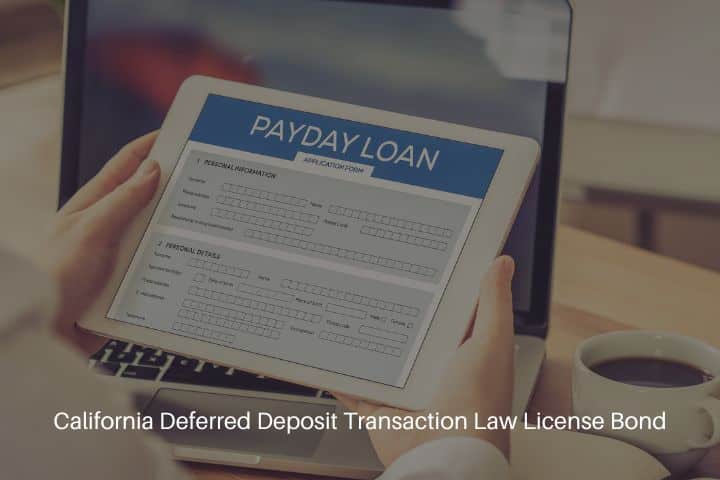
Get An Instant Quote on California Deferred Deposit Transaction Law License Bond Now

In California, businesses engaged in deferred deposit transactions, commonly known as payday lending, are required to obtain a license and secure a bond as per the Deferred Deposit Transaction Law (DDTL). One critical component of this licensing process is the California Deferred Deposit Transaction Law License Bond. But what exactly does this bond entail, and how does it ensure compliance within the payday lending industry?
At its core, the California Deferred Deposit Transaction Law License Bond functions as a safeguard for consumers and regulatory authorities. By requiring payday lenders to secure the bond, the state ensures that borrowers have recourse for financial losses or damages resulting from lender misconduct or failure to comply with regulations. In the event that a payday lender engages in fraudulent activities, violates state laws, or fails to fulfill its obligations, affected parties can file a claim against the bond to seek compensation for their losses. Additionally, the bond acts as a deterrent against unethical behavior, as lenders risk losing their license and facing financial penalties for non-compliance.
For borrowers, the California Deferred Deposit Transaction Law License Bond provides reassurance when obtaining payday loans. It offers a layer of financial protection against potential risks and ensures that borrowers have recourse in case of lender misconduct. For payday lenders, obtaining the bond signifies a commitment to ethical conduct and regulatory compliance. It demonstrates to borrowers, regulatory authorities, and other stakeholders that lenders are financially responsible and capable of providing transparent and fair lending services. Additionally, the bond helps maintain trust and confidence in the payday lending industry, fostering positive relationships between lenders and borrowers.
The California Deferred Deposit Transaction Law License Bond plays a crucial role in promoting consumer protection and integrity within the payday lending industry. By providing financial assurance and recourse for borrowers, it helps mitigate risks associated with lender misconduct or negligence. As California continues to prioritize consumer protection and regulatory compliance, the importance of measures like the deferred deposit bond cannot be overstated. It’s not just about providing short-term loans—it’s about ensuring transparency, fairness, and accountability in every financial transaction facilitated by payday lenders within the state.
The California Deferred Deposit Transaction Law License Bond is a form of financial security mandated by the state for businesses operating under the Deferred Deposit Transaction Law. This bond serves as a guarantee that payday lenders will comply with state regulations, adhere to ethical standards, and fulfill their financial obligations to consumers. Essentially, it provides assurance to borrowers, regulatory authorities, and other stakeholders that payday lenders will operate with integrity and accountability.

While the primary purpose of the bond is to provide financial assurance for compliance with state regulations and fulfillment of financial obligations, questions may arise regarding its coverage for liabilities related to misrepresentation of loan terms and conditions. Payday lenders may face potential liabilities resulting from disputes or legal actions related to hidden fees, misleading interest rates, or deceptive repayment terms in loan agreements. It’s essential for lenders to ensure they have proper liability insurance coverage or bonding options to address potential liabilities related to misrepresentation effectively.
While the bond requirement primarily focuses on financial assurance and compliance with state regulations, questions may arise regarding its coverage of responsibilities and liabilities related to federal laws and regulations governing consumer lending practices. Payday lenders may seek to ensure compliance with laws such as the Truth in Lending Act (TILA) or the Consumer Financial Protection Bureau (CFPB) regulations by implementing appropriate policies and procedures, providing accurate disclosures, or responding to consumer complaints in a timely manner. It’s essential for lenders to understand their responsibilities in this area and take appropriate measures to mitigate risks effectively.
While the bond is designed to provide financial assurance for compliance with state regulations and fulfillment of financial obligations, questions may arise regarding its coverage for liabilities related to debt collection practices. Payday lenders may face potential liabilities resulting from disputes or legal actions related to aggressive or unfair debt collection practices, such as harassment, intimidation, or false threats of legal action against borrowers. It’s essential for lenders to ensure they have proper liability insurance coverage or bonding options to address potential liabilities related to debt collection practices effectively and adhere to state and federal laws governing fair debt collection.
Axcess Surety is the premier provider of surety bonds nationally. We work individuals and businesses across the country to provide the best surety bond programs at the best price.